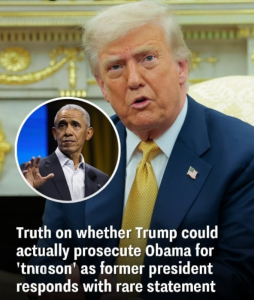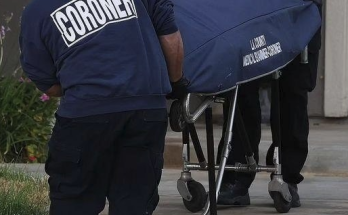Could Donald Trump Actually Take Legal Action Against Barack Obama? Here’s What the Law — and History — Says
In the ever-charged landscape of American politics, headlines claiming that “Trump is planning legal action against Obama” stir emotions, fuel speculation, and dominate social media feeds. But could former President Donald Trump actually take legal action against former President Barack Obama — and would such a move have any legal merit?
To answer that, we need to examine the legal grounds, the constitutional framework, historical precedent, and what legal experts say about one president attempting to prosecute another. The short answer? It’s highly unlikely — and legally complicated — but not entirely impossible under very specific and rare circumstances.
Here’s a breakdown of what it would take, what’s at stake, and what’s real — versus what’s just political theater.
1. Legal Action: What Does That Even Mean?
When people say “take legal action,” they could be referring to several things:
-
Filing a civil lawsuit
-
Calling for a criminal investigation
-
Pushing for a congressional inquiry or prosecution
-
Filing charges through the Department of Justice (DOJ)
-
Pursuing a private lawsuit for defamation or personal damages
The key point is this: Donald Trump, as a private citizen or political figure, does not have the authority to prosecute anyone. Only the Department of Justice, through federal prosecutors, can file criminal charges — and even then, the decision must be based on evidence, not political motivation.
2. Can One Former President Sue Another in Civil Court?
Yes, theoretically. One citizen can sue another for civil matters like defamation, emotional distress, or financial damages — and former presidents are not above civil law.
For example:
-
If Trump believed Obama defamed him in a speech or publication, he could file a lawsuit for defamation.
-
If Trump believed Obama interfered in his business or campaign unlawfully, he could attempt a civil case.
However, lawsuits involving political figures are extremely difficult to win. Here’s why:
-
Public figures have a higher burden of proof in defamation cases.
-
Former presidents have some legal immunities, especially for actions taken while in office.
-
Courts are reluctant to engage in politically charged lawsuits without clear and overwhelming evidence.
So while it’s possible in theory, any civil lawsuit from Trump against Obama would face serious legal challenges — and would likely be dismissed early unless there was solid, specific evidence.
3. Can Trump Call for Obama’s Criminal Prosecution?
Trump can publicly demand investigations. He can make allegations, and he can even try to pressure the DOJ or campaign on promises of “accountability.” But again, he cannot prosecute Obama himself.
Even if Trump were re-elected president, he would still need:
-
The Department of Justice to independently investigate and bring charges.
-
Credible evidence of a crime that is within the statute of limitations.
-
A willingness by DOJ officials to risk the perception of political retribution.
The U.S. justice system is designed to prevent political prosecutions — meaning a president cannot simply jail a political opponent without due process and legal cause. This is the foundation of American democracy, and any deviation would provoke constitutional crises and global condemnation.
4. What Would Trump Even Try to Charge Obama With?
There have been a few recurring allegations floated in right-wing circles over the years, including:
-
Spying on Trump’s 2016 campaign (the so-called “Obamagate” theory)
-
Weaponizing federal agencies like the FBI or CIA for political purposes
-
Unmasking of U.S. citizens in intelligence reports
-
General corruption or abuse of power
But to date, no investigation — not even under Trump’s DOJ — has produced charges against Obama or his administration.
“Obamagate,” for example, was widely dismissed by legal scholars and intelligence experts. The DOJ itself, under Trump-appointed Attorney General William Barr, said it found no wrongdoing by Obama or Vice President Joe Biden.
5. What Legal Experts Say
Most legal scholars agree that any effort by Trump to “go after” Obama would be symbolic, not substantive.
-
Laurence Tribe, a Harvard constitutional law professor, has said such moves would be “anti-democratic, legally baseless, and potentially unconstitutional.”
-
Former federal prosecutor Elie Honig noted that trying to prosecute a former president with no clear criminal act would “undermine the integrity of the justice system.”
-
Neal Katyal, former Acting Solicitor General, warned that weaponizing the DOJ to attack political opponents “would erode the rule of law.”
In other words: Legal action based on political rivalry is not just dangerous — it’s legally hollow.
6. Has It Ever Happened Before?
No U.S. president has ever successfully pursued criminal or civil charges against a former president. Even Richard Nixon, after resigning in disgrace during Watergate, was pardoned by his successor, Gerald Ford — not prosecuted.
Why?
Because presidential transitions depend on peaceful transfer of power and institutional respect. Prosecuting former leaders for political purposes is what often happens in authoritarian regimes — not democracies.
Even when wrongdoing is suspected, most presidents avoid targeting their predecessors directly. It sets a dangerous precedent where every outgoing leader fears legal retaliation — turning politics into a cycle of vengeance.
7. Trump’s Strategy: Political Theater or Real Legal Threat?
Donald Trump is a master of media headlines, and threats of “going after Obama” often serve more as rhetorical tools than actual legal strategies. They stir his base, reinforce loyalty, and fuel narratives of victimhood and conspiracy.
In 2020, Trump tweeted “Obamagate!” over a dozen times — but never clarified what crime had supposedly been committed. When pressed in interviews, even he struggled to define the accusation.
It’s more about framing Obama as the villain than actually expecting jail time.
8. What Would Happen If Trump Did Try to Use the DOJ as a Weapon?
If re-elected and Trump tried to push the DOJ to go after Obama without evidence, several things could happen:
-
DOJ officials could resign or refuse unlawful orders.
-
Judges could toss out politically motivated cases.
-
Congress could launch investigations into abuse of power.
-
The public could respond with protests, lawsuits, and political blowback.
Abuse of prosecutorial power could even result in Trump himself facing legal jeopardy for obstruction of justice or civil rights violations.
Conclusion: Can Trump Legally Go After Obama?
Technically? He can file lawsuits as a private citizen or call for investigations.
Practically? He has almost no legal grounds, and the barriers are immense.
Realistically? Any such move would likely be seen as political theater, designed to energize a base, distract from his own legal troubles, and shape a “deep state” narrative.
In the end, the law is designed to protect everyone, including former presidents — not from accountability, but from politically motivated witch hunts. If wrongdoing is ever proven with credible evidence, the justice system has channels to handle it. But using it as a weapon? That’s a danger far greater than any partisan fight.

